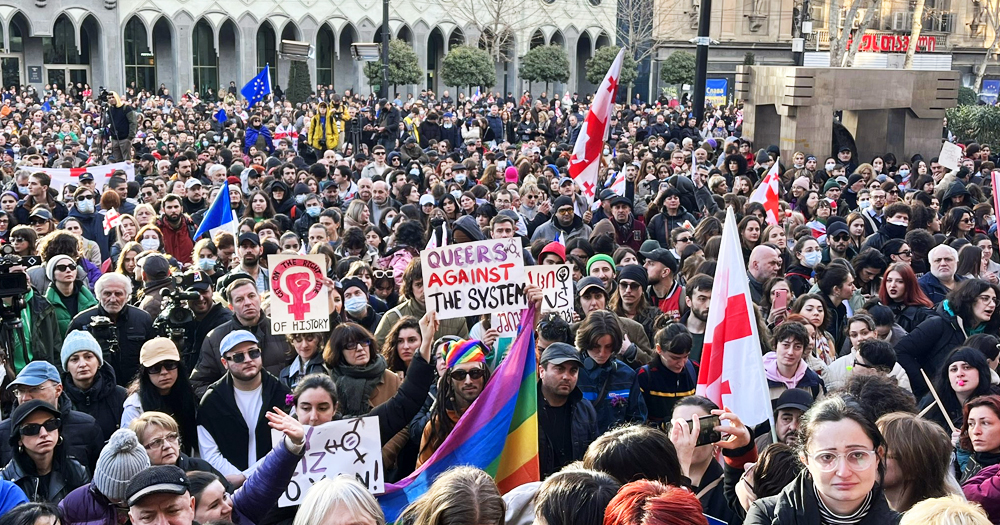On Tuesday, September 17, Georgian lawmakers approved an anti-LGBTQ+ law that is reminiscent of measures adopted in neighbouring Russia, as ties between the two countries continue to deepen.
With 84 of the 150 lawmakers voting in favour, the bill was approved on its third and final reading. It includes bans on same-sex marriage, adoption by same-sex couples, gender-affirming care and depiction of LGBTQ+ identities in the media. It also provides a legal basis for authorities to outlaw Pride events and displays of the rainbow flag.
The anti-LGBTQ+ law was introduced by the ruling party Georgian Dream earlier this year ahead of October’s elections, where the party is seeking a fourth term in office. Their campaign has heavily focused on cracking down on LGBTQ+ rights in a supposed effort to protect “traditional values”.
“Traditional values” are also a cornerstone of the rhetoric employed by Russia against the LGBTQ+ community. The country recently outlawed the “LGBTQ+ movement” by labelling it an extremist organisation, a measure that has already been used to suppress activism in a country that already had anti-LGBTQ+ legislation in place.
In recent months, Georgian Dream has deepened its ties with the Kremlin, passing a law on “foreign agents” earlier this year that US critics deemed authoritarian and Russian-inspired. Activists have stated that the new anti-LGBTQ+ law, also reminiscent of Russian legislation, is aimed at boosting conservative support for the Georgian government.
Georgia’s anti-LGBT law undermines freedoms, stigmatizes a segment of the population, and encourages discrimination and even violence. We call for the repeal of this law, which is contrary to human rights and the European and international commitments of 🇬🇪. #LGBT+ pic.twitter.com/Z3gfhRqkEV
— Jean-Marc Berthon (@BerthonJeanMarc) September 18, 2024
Director of Tbilisi Pride Tamara Jakeli said the bill will likely force her organisation to close. “This law is the most terrible thing to happen to the LGBT community in Georgia,” she told Reuters. “We will most likely have to shut down. There is no way for us to continue functioning.”
The law now needs to be signed by President Salome Zourabichvili, a critic of Georgian Dream, who has reportedly declared that she will veto the bill. However, the ruling party and its allies have enough seats in Parliament to override her veto, and the President’s powers are mostly ceremonial.
Georgia’s anti-LGBT law undermines freedoms, stigmatizes a segment of the population, and encourages discrimination and even violence. We call for the repeal of this law, which is contrary to human rights and the European and international commitments of 🇬🇪. #LGBT+ pic.twitter.com/Z3gfhRqkEV
— Jean-Marc Berthon (@BerthonJeanMarc) September 18, 2024
According to Jakeli, the only way the law could be stopped is if Georgian Dream were to lose the elections in October, although she added that the opposition parties are not open in their support for LGBTQ+ rights. “The only way we can survive in this country and have any progress on LGBT rights is for us to go in great numbers to the elections and vote for change,” she said.
Polls show that LGBTQ+ rights are not widely supported in Georgia, with a majority of people disapproving of same-sex relationships. Participation in Tbilisi’s Pride marches always comes with the threat of physical attacks by anti-LGBTQ+ agitators. Last year, an LGBTQ+ festival in the Georgian capital was stormed by opponents, forcing its cancellation.
Additionally, the Orthodox Church has widespread influence in the country and demonstrations against LGBTQ+ rights are frequent. Earlier this year, tens of thousands marched in the capital to “protect traditional values”.
© 2024 GCN (Gay Community News). All rights reserved.
Support GCN
GCN is a free, vital resource for Ireland’s LGBTQ+ community since 1988.
GCN is a trading name of National LGBT Federation CLG, a registered charity - Charity Number: 20034580.
GCN relies on the generous support of the community and allies to sustain the crucial work that we do. Producing GCN is costly, and, in an industry which has been hugely impacted by rising costs, we need your support to help sustain and grow this vital resource.
Supporting GCN for as little as €1.99 per month will help us continue our work as Ireland’s free, independent LGBTQ+ media.
